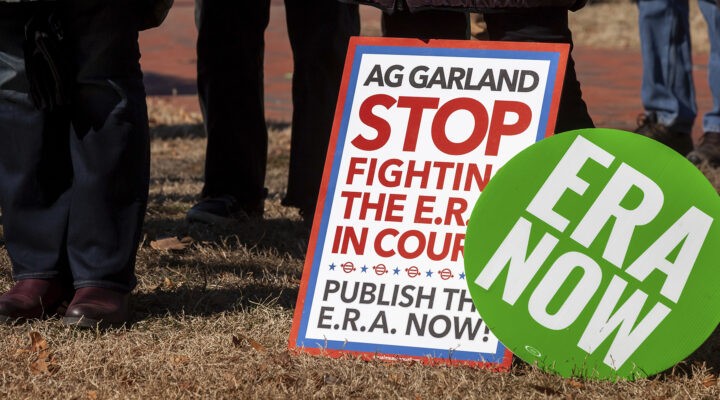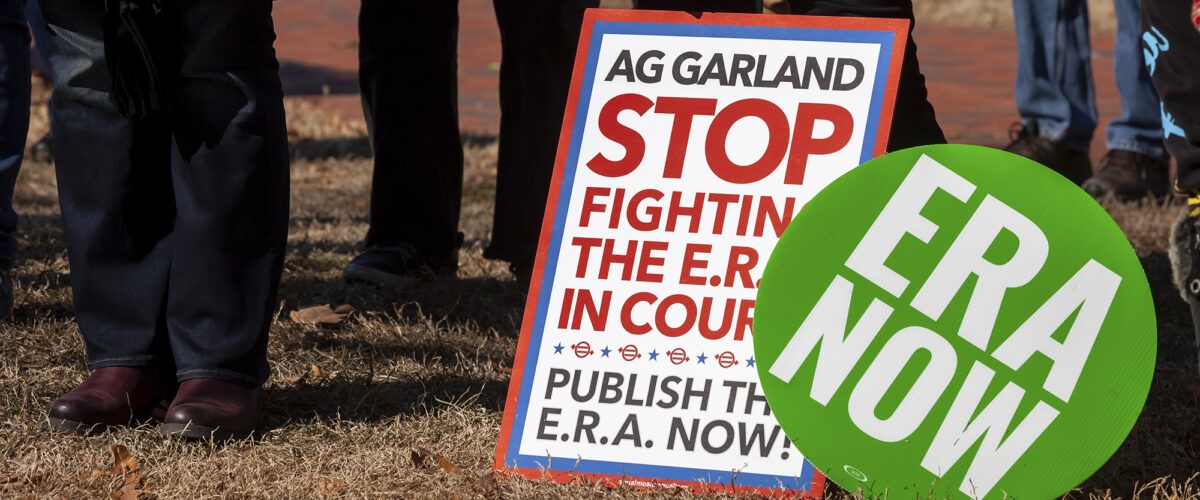Fifty years ago, Congress passed a constitutional reform to ensure “equality of rights under the law shall not be denied or abridged … on account of sex.” On March 22, 1972, a bipartisan supermajority sent the Equal Rights Amendment to the states for ratification. Although 38 states have since ratified the ERA, its fate hangs in the balance as some levy procedural objections and religious opponents miscast the ERA as synonymous with abortion rights. This is a gross injustice.
In truth, the Equal Rights Amendment is a basic human rights reform supported by the vast majority of American citizens and embraced by 85% of nations, which have similar provisions. It represents the principle of equality under the law and has garnered votes from pro-life and pro-choice lawmakers. The ERA offers a just, humane and effective path to reducing abortion, by transforming a system that tolerates its root causes: injustice and violence against women.
“The ERA offers a just, humane and effective path to reducing abortion, by transforming a system that tolerates its root causes: injustice and violence against women.”
Even among faith leaders who lament the prevalence of abortion, there is growing consensus that draconian laws like the Texas statute upheld last fall are no way to honor the sacred dignity of a pregnant woman or a nascent life within her. They are deeply problematic in a society where four women are murdered each day by their partners and the risk of homicide skyrockets around pregnancy. And they are a cruel maneuver to foist on poor women, who make up three-quarters of abortion patients, when each child carries a 7% wage penalty in a marketplace that devalues mothers.

Ally McKinney
As long as our laws and policies remain callous toward women’s struggles and suffering, abortion will always be with us.
Today, however, our country has a historic opportunity to make America a place where more mothers flourish. In January, the White House urged the U.S. House to pass a resolution recognizing the ERA as the 28th Amendment, now that three-fourths of states have ratified it. The Department of Justice clarified that a Trump-era legal memo presents no legal barrier. The House already has passed a bill to declare there is no time limit on ratification. All that remains is for the U.S. archivist to publish the ERA and for public officials to respect it.
The ERA will empower Congress and the courts to deter violence against women, ensure women receive fair pay for their labors, and afford pregnant workers the protections they need, as Justice Revival details in a recent analysis.
Right now, a pregnant worker can miscarry when compelled by her employer to push her physical limits and find no legal recourse. Pregnancy discrimination remains outside the reach of the Equal Protection clause, and the Pregnancy Discrimination Act has been blunted by the courts. Mothers have no guarantee of paid maternity leave, contributing to America’s shameful maternal mortality rate.

Meghan Tschanz
The ERA will provide a legal basis for equality that is “fundamental and substantive,” giving Congress power to address pregnancy discrimination and maternal mortality. Right now the proposed Black Maternal Health Momnibus Act of 2021 relies on the Commerce Clause as its constitutional foundation; the ERA would provide a more robust basis for this crucial measure.
The ERA also will provide a new standard to promote equal pay. Working women make just 82 cents on average for every dollar a man makes. Single mothers bring in only 54 cents to the dollar earned by married men. As a result, around a quarter of single mothers are living in poverty. One study found that “if single working mothers received equal pay… their ‘very high poverty rate’ would be cut in half.”
The ERA also will provide a basis for laws like the Violence Against Women Act that prevent and deter rape — a crime that affects one in five U.S. women and has led to almost 3 million forced pregnancies. In 2000, the Supreme Court struck down a key provision of VAWA, ruling the Constitution does not allow Congress to empower survivors to sue their rapists. Women have faced repeated roadblocks to justice in the face of widespread violence.
These are a few reasons why hundreds of faith leaders have signed an Interfaith Statement in Support of the ERA, and ministries like Justice Revival are championing the #Faith4ERA campaign.
Women need the ERA, mothers need the ERA, and anyone serious about humanely and justly reducing abortions needs the ERA, too.
Allyson McKinney Timm, founder and executive director of Justice Revival, is a human rights lawyer and Christian faith leader with decades of experience advocating for women and girls. She has published several recent articles on the ERA, convened the #Faith4ERA campaign, and led the creation of an Interfaith Statement of Support for the ERA, signed by 560 faith leaders nationwide. Meghan Tschanz, author of Women Rising and host of the “Faith and Feminism” podcast, is passionate about challenging the traditional gender roles of her faith tradition. She has experience working with vulnerable women around the world and has since dedicated her life to advocating for girls and women.
Related articles:
Why Christians should support the Equal Rights Amendment | Opinion by Carrie N. Baker and Susan M. Shaw
Diverse religious coalition urges Congress to finalize the Equal Rights Amendment


